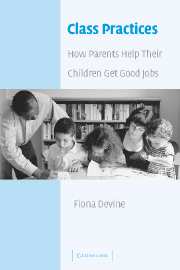Book contents
- Frontmatter
- Contents
- List of tables
- Acknowledgements
- 1 Introduction
- 2 Material help with education and training
- 3 Financial choices and sacrifices for children
- 4 Expectations and hopes for educational success
- 5 Fulfilling potential and securing happiness
- 6 Contacts, luck and career success
- 7 Friends and networks in school and beyond
- 8 Conclusion
- Appendix A The interviewees
- Appendix B Doing comparative research
- Notes
- List of references
- Author index
- Subject index
5 - Fulfilling potential and securing happiness
Published online by Cambridge University Press: 22 September 2009
- Frontmatter
- Contents
- List of tables
- Acknowledgements
- 1 Introduction
- 2 Material help with education and training
- 3 Financial choices and sacrifices for children
- 4 Expectations and hopes for educational success
- 5 Fulfilling potential and securing happiness
- 6 Contacts, luck and career success
- 7 Friends and networks in school and beyond
- 8 Conclusion
- Appendix A The interviewees
- Appendix B Doing comparative research
- Notes
- List of references
- Author index
- Subject index
Summary
As Bourdieu had led me to expect, the middle-class parents of my American and British interviewees mobilised their cultural resources to facilitate their children's educational and occupational advancement. They assumed and expected that their children would do well in school and they held high occupational aspirations for them. These dispositions and values contributed to the interviewees' success in becoming doctors and teachers. That said, in both countries, the parents of my working-class interviewees did not lack cultural capital. They also placed a high premium on academic success although they hoped rather than assumed that their children would do well. Their occupational horizons were somewhat more modest than their middle-class counterparts but they did not seek to limit their children's aspirations as academic success propelled them onwards. They were keen, in other words, to take up educational opportunities that expanded in the post-war period of prosperity. In this chapter, I turn my attention to how the interviewees, now all middle-class parents, seek to mobilise their cultural resources to ensure their children's educational and occupational success. Most of the interviewees' children were still making their way through the education system although some of them, as young adults, were seeking to establish themselves in the labour market. Despite the diversity in their ages, all of them had been in education from the 1980s onwards when a harsher economic and political climate, including tax cuts reducing the quality of public and state educational provision, took hold.
- Type
- Chapter
- Information
- Class PracticesHow Parents Help Their Children Get Good Jobs, pp. 95 - 119Publisher: Cambridge University PressPrint publication year: 2004

